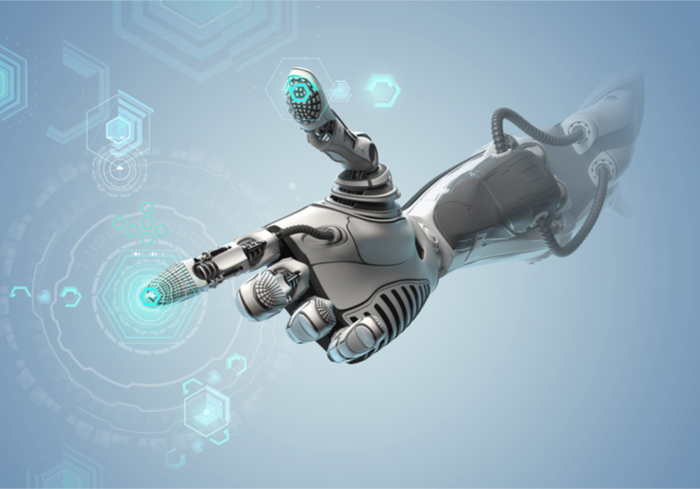How Robots Are Serving The QSR Galaxy

When robots aren’t out saving the galaxy, they’re making pizza? That may soon be the case — at least in quick-service restaurants (QSRs).
Little Caesars received a patent on Tuesday (March 13) for what it calls an “apparatus provided for assembling pizza,” The Spoon reported.
The machine can complete the tasks needed to make a pizza oven-ready: It reportedly comes with “a pizza sauce-spreading station, a cheese-spreading station and a pepperoni-applying station.”
To add on the required ingredients, the pizza robot comes with an arm that can hold the pizzas along with a dial system to make sure the robot can put the right amount of cheese and pepperoni on top.
As a result, staff at Little Caesars will be able to complete other tasks besides, well, preparing pizza. For consumers, the technology could allow consumers to receive a more consistent product — and get that pepperoni pie a little bit faster.
According to ZDNet, the change from human pizza makers to robotic workers makes sense. Quick-service restaurants such as Little Caesars work like small factories with several separate tasks spread across an assembly line, after all.
However, the spread of innovative tech has been slow in the industry, due to the high cost of robots and the low cost of wages for human workers.
That has now changed: Robots seem to be an attractive alternative to human workers, as workers at QSRs demand higher wages and the price of robots has gone down as more companies adopt them.
As a result, Little Caesars is hardly the only company looking to bring new technology to the age-old business of pizza making: Other companies have begun investing in robotic technology too.
Another (Robotic) Pizza Maker in the Kitchen
Investors want a slice of the robotic pizza market: In 2017, Zume Pizza, a robotics startup that designed a robot to make pizza, raised close to $50 million in venture funding.
The pizza delivery company is using robots and humans to make and deliver pizza in the U.S. The robots are used for the tasks that need to be repeated — such as spreading tomato sauce on pizzas and placing them in the oven.
But robots beware: Recipe development, food prep and pizza-tasting is still left to humans.
Zume isn’t the only company embracing technology when it comes to making and delivering pizza to hungry consumers. Another example is Domino’s, which launched Easy Orders in 2013 and introduced the voice-activated feature on Alexa at the end of July.
Customers simply need to create an Easy Order account, which allows them to save their favorite order and submit it through Domino’s website, app, Facebook Messenger or Google Home.
Burger-Flipping Robots
Robots aren’t just for preparing pizza: They can flip burgers too. Pasadena, California-based startup Miso Robotics developed Flippy, an automated fast food burger-flipper.
Miso’s burger bot can flip burgers twice as fast as a human using its singular arm, and it’s powered by deep machine learning — meaning it can use feedback loops to learn from its co-workers in the kitchen as well as from its own mistakes.
So, while Flippy is just an assistant today, still requiring human hands to cut veggies and place cheese on burger patties, those are skills it could theoretically learn (and which a similar robot by Momentum Machines already has), one day fully taking the place of its $15-per-hour kitchen comrades.
However, the technology hasn’t always worked out as planned — at least not for its launch: Flippy was apparently on break from its job at CaliBurger after just one day on the job last week. The reason? Human workers couldn’t keep up with the fast pace the robot demanded.
“When you’re in the back working with people, you talk to each other,” Anthony Lomelino, chief technology officer for Cali Group, told USAToday. “With Flippy, you kind of need to work around his schedule. Choreographing the movements of what you do, when and how you do it.”
The demand for burgers at CaliBurger isn’t helping. Diners, intrigued by the technology, have been flocking to the chain.
After all, Flippy can accomplish a monumental feat: It can grill as many as 2,000 hamburgers in one day. It seems Flippy’s (human) co-workers need more training to keep up with its pace.
Only time will tell if that will be the case for Little Caesars’ pizza robot.